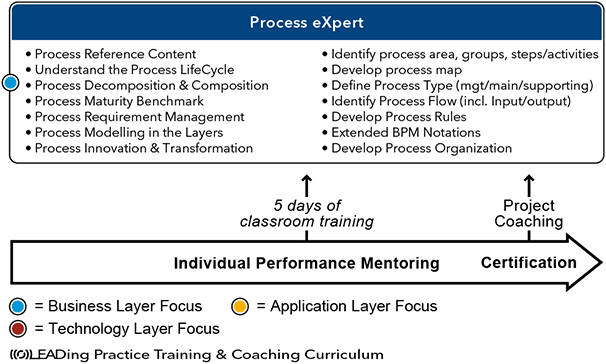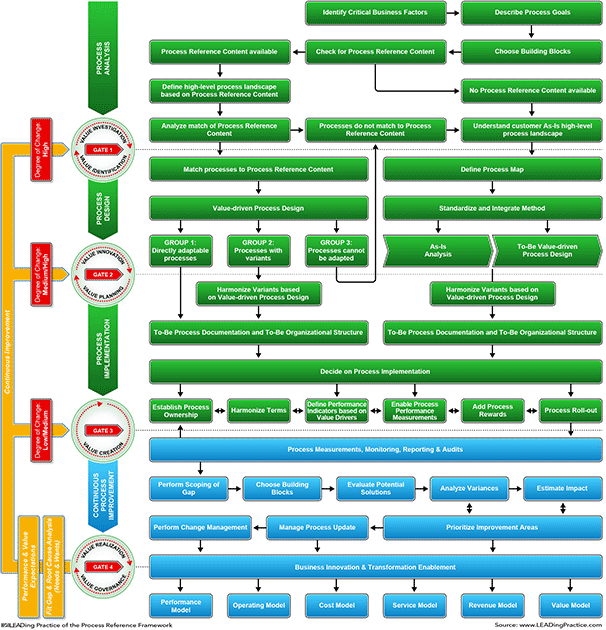Target Audience
Chief Process Officer
Project Manager/Director
Business Process Analyst
Business Process Manager
Business Process Modeller
Business Process Owner
Business Process Designer
Business Decision Analyst
Business Analyst
IT Professional
With the focus on how to automate what you do as a discipline today, the Process eXpert certification program is uniquely designed with process modelling training, project mentoring in the participants own existing company projects. This ensures highest level of knowledge transfer and skills building to meet today’s organizations cross-disciplinary competency requirements for professionals involved in projects.
The Process eXpert certification program has been structured to build on the existing competencies of the practitioner and to infuse a new way of thinking, working and modelling. This is done through intensive classroom training, in-depth tutoring and coaching throughout the modules, as well as with hands-on project experience, where you apply the acquired process modelling techniques and its related disciplines.
Learning Model
The Process eXpert certification program is based on an intensive classroom training module supported with in-depth individual performance mentoring on a selected project. The hands-on experience ensures that the business process management and modelling skills are applied within the following disciplines:
- Business Process Principles:BPR, Six Sigma, TQM and LEAN process tracking, process pain points and process bottlenecks.
- BPMN 2.0:Process modelling notations, tasks, objects, activities, events, gateways and eXtended BPMN.
- Process Monitoring:Identify, categorize and develop organizational process control and monitoring and link them to the organizational reporting (e.g. scorecards, dashboards and cockpits).
- Value-based Process Modelling:Process mapping based on strategy and value principles and process value clusters.
- Continuous Improvement Approach:Process ownership, process office, measurements, monitoring, continuous improvement approach and process change methods.

Process eXpert Roadmap
Individual Performance Mentoring
It is only through mentoring and building on the existing knowledge that competencies are gained and applied. The Individual Performance Mentoring (IPM) is an integrated element of the Process eXpert certification path to ensure the frameworks, methods, models, modelling principles are customized, adopted and applied in a real-world project setting with a personalized action plan. The participant will discover how to drive forth fundamental changes within their organization and to achieve the objectives set in transformation projects.
Upon successful completion of this program, you will become a certified Process eXpert.
Program Contents
This certification program includes:
- 3 x 1.5 hours of digital pre-recorded sessions
- 5 days of classroom training
- Individual Performance Mentoring during the course
- 1 Certificate
If two or more participants from your organization are participating in this certification program, you will have the opportunity to use your own process models and thereby work on a personalized case for your company.
Our curriculum is a professional and globally recognized career path built on international standards that are in use today. Our career path offers a certified Process eXpert the opportunity to become a certified Business Architect, Process Architect, LEAD Enterprise Architect and Chief Enterprise Architect.
Target Audience
Designed for professionals with >3-5 years of experience:
- Specialist: Process eXpert, Business Analyst, Process Specialist, Process Method Specialist (BPR, Six Sigma, TQM and/or LEAN practitioner) and Quality/Production/Manufacturing Specialist.
- Consultant: Process Consultant, Service Consultant, Business Consultant and Transformation Consultant.
- Architect: Process Architect, Enterprise Architect, Technology Architect, Solution Architect, Application Architect, Business Architect, Service Architect, Information/Data Architect and Value Architect.
- Manager: Process Manager, Service Manager, Business Manager and Project Manager.
- Director: Process and Business Owner, LoB Director and LoB Owner.
Value Of This Certification Program
At the end of this program, you will be able to work effectively and efficiently within:
- Way of Thinking
- Way of Working
- Way of Modelling
- Way of Governance
Focus Area
- Identify process requirements
- Focus on pain points, bottlenecks and benchmarking
- Develop process standardization
- Ensure process integration
- Continuous process improvement
Relation to Strategy
- Align business processes to operational goals
- Process innovation based on operational objectives
- Link activities to Business Model transformation
Task & Services
- Work with process owners
- Identify and categorize process area and group
- Analyze, design and implement business processes
- Benchmark process maturity levels
- Define process standardization and integration
- Set up process measures and monitoring
The needed skill for abstraction level for a Process eXpert
- Concrete (tangible, existing and actual)
- Descriptive and specification (explanation, depiction/sketch and portrayal often using a map, matrix and/or model)
- Design (plan, intend and aim)
A Process eXpert defines, develops and creates the following maps, matrices and/or models:
- Process (BPMN)
- Process Workflow
- Process Objects
- Process Performance
- Process Measurement & Reporting
- Process Roles
- Process Rules
- Process Channel
- Process Media
- Process Maturity
- Process Requirements
- Transformation
- Business Case
Decisions
- Requirement decisions; process, task, event and gateways
- Scenario decisions; rules, flow and measurements
Scopes
- Enterprise-wide
- Specific process area, group or process
- Process solutions
- Process projects
- Process flows
The Way of Governance is the act of governing what exist or in the process of getting developed/deployed. The Way of Process Governance is therefore an essential part of developing a holistic and integrated process approach to verify and ensure value identification and creation for the organization. In the context of process modelling principles, the course participant will learn to think and split their work into the relevant process lifecycle.
The lifecycle thinking is vital as it represents the course of developmental changes through which the process components evolve in terms of innovation and/or transformation as it passes during its lifetime. From process analysis, process design, process implementation and continuous process improvements.
Thereby the process lifecycle consists of a set of steps/phases in which each phase uses the results of the previous one. It provides a sequence of phases and activities for process experts and process architects.

